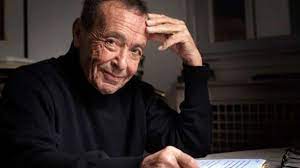Until he was admitted to hospital at the end of March, he had insisted on never wearing a face mask, shaking hands and refusing to be vaccinated.
Finally struck down by the new coronavirus, Covid-19, Bechir Ben Yahmed nicknamed BBY died on Monday, May 3 at the Lariboisiere Hospital in Paris, France, more than 60 years after he founded the most famous, and arguably, the most influential, pan-African newspaper, Jeune Afrique.
The story of Ben Yahmed and that of his famous magazine cannot be told without each other. They are one and the same story.
In a way, it began in 1960, a particularly busy year in Africa when most of the former colonies began to attaining independence.
Born to a petty bourgeoisie family on the Djerba Island on April 2, 1928, Bechir as his friends called him is one of the first Africans to have received a distinction from the prestigious French School of Business Studies (HEC, Paris).
In the mid-1950s, when France, which since 1881 had turned his country Tunisia into a protectorate, he was part of the Tunisian delegation in the negotiations with the French government on internal self-government leading to independence.
This is the time when he participated in the creation of a first newspaper, the weekly L’Action, published for the first time in April 1955 with a certain political leader rising among the Tunisian nationalists as co-founder, Habib Bourguiba, who was also his mentor.
The newspaper ceased to appear in September 1958. Earlier in April 15, 1956, Ben Yahmed was appointed Deputy Minister of Information to the office of Prime Minister Habib Bourguiba, for whom he was responsible for writing a large part of official speeches.
Due to his young age, however, he could not sit in the Constituent Assembly that was tasked with drafting a new constitution for the country.
Having fell out with Bourguiba, who became president, after removing from power the Bey (governor representing the Ottoman Empire in Tunis) and abolishing the monarchy, Ben Yahmed resigned from the government in September 1957.
Three years later, on October 17, 1960, he created Afrique Action.
Bourguiba, annoyed by some articles, which were not favorable to his policy, sent him the governor of Tunis to inform him that he needed to change the name of the newspaper, the new president claiming the authorship of the title L’Action.
It is in a solitary drive, just after the departure of the presidential emissary, that Ben Yahmed, who insisted on keeping the word Afrique (Africa), precedes him with the epithet Jeune (Young).
The new title was officially born on November 21, 1961.
After a year in Rome, the newspaper moved and settled permanently in Paris at the end of 1964.
Several great renowned media writers and men of letters have worked for or collaborated with the newspaper.
Some of them are the author of “Peau Noire, Masques Blancs,” the anti-colonial activist of the West Indies, Frantz Fanon; the writer, playwright and Algerian independence activist, Kateb Yącine who authored the book “Le français est notre de butin guerre”, a sentence that has gone trendy, the French academician of Lebanese origin Amin Maalouf who was the paper’s editor-in-chief; Sennen Andriamirado of Madagascar, the biographer of Thomas Sankara, Jean-Pierre Ndiaye of Senegal whose radical chronicles for the “Black Cause” were eagerly awaited and scrutinized in Africa and in the Diaspora, etc.
Very quickly linked to the most influential circles in Africa and France, Ben Yahmed rubbed shoulders with men who were as different as they were powerful: Nasser, Lumumba, Che Guevara, Castro, Houphouet-Boigny, Senghor, Bongo, Hassan II, Mitterrand, Rocard and of course, Jacques Foccart, a preeminent figure in Africa and for the election multiple times of General De Gaulle as president and his successors at the Elysee Palace.
Before his death in March 1997, Foccart had an unchanging habit with Ben Yahmed: a one-on-one dinner once a month.
The inventor of “Françafrique” would have even made the boss of Jeune Afrique his “sole legatee.”
The son of traders from Djerba and a former business student also made big money.
Along with the huge advertising revenues from Jeune Afrique, he created a publishing house, a communications and advertising company.
He also set up a real estate agency and published The Africa Report, a publication for English-speaking Africa.
In 2006, he created La Revue, of which he remained the director and editor-in-chief after retiring the following year and organizing his succession within the newspaper and the Jeune Afrique group.
His wife Danielle, he married a second time in 1969 in Rome, and their two sons Amir and Marwane Ben Yahmed occupy strategic positions within the group.
Marwane is currently Deputy Editorial Director and Central Editor-in-Chief of Jeune Afrique.
Their half-brother, Zyad L’imam, was born from the first marriage of their mother, Danielle with a senior Tunisian civil servant who died in a plane crash.
He has taken over from his mother, the control of Afrique Magazine.
LOS/cgd/fss/as/APA


